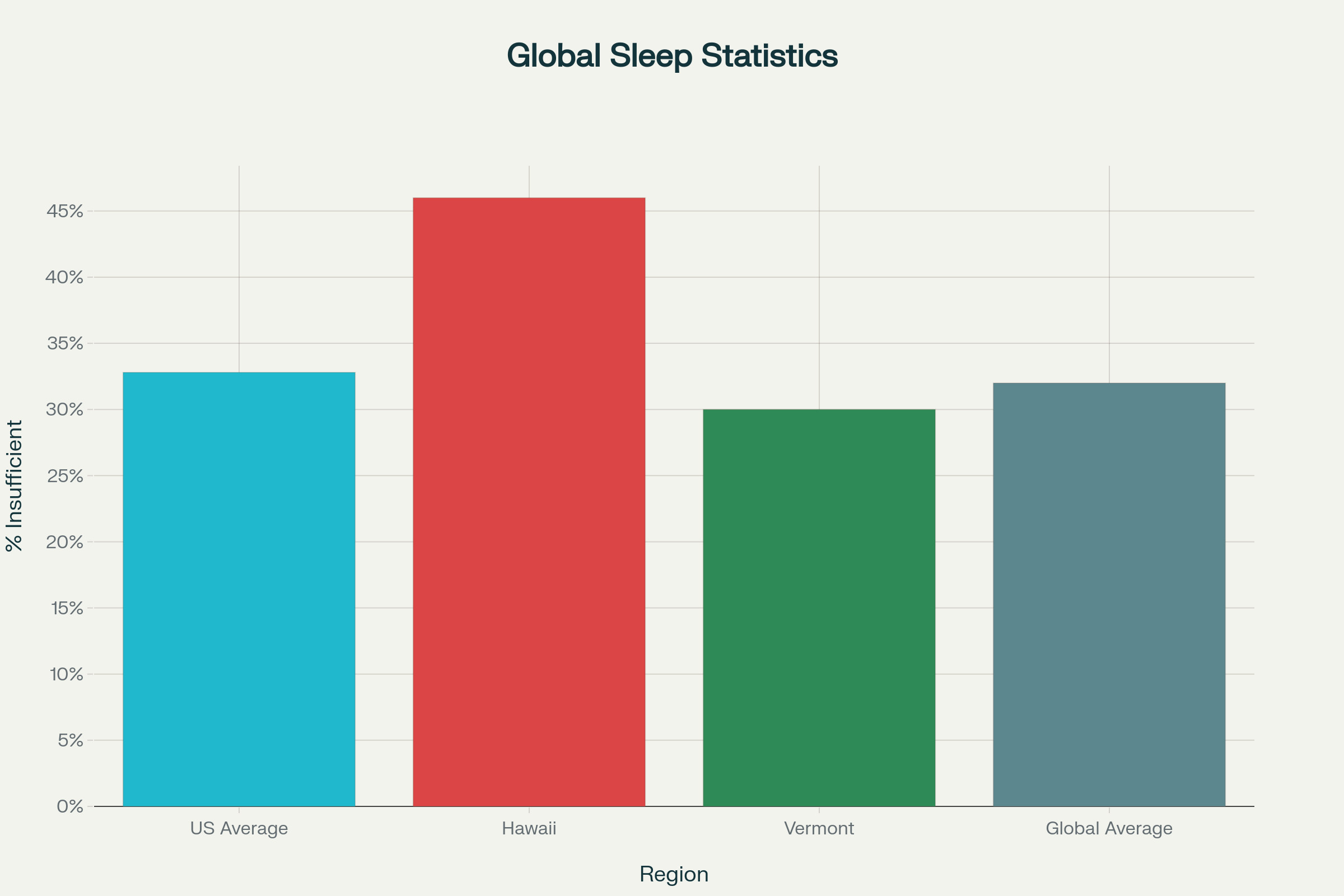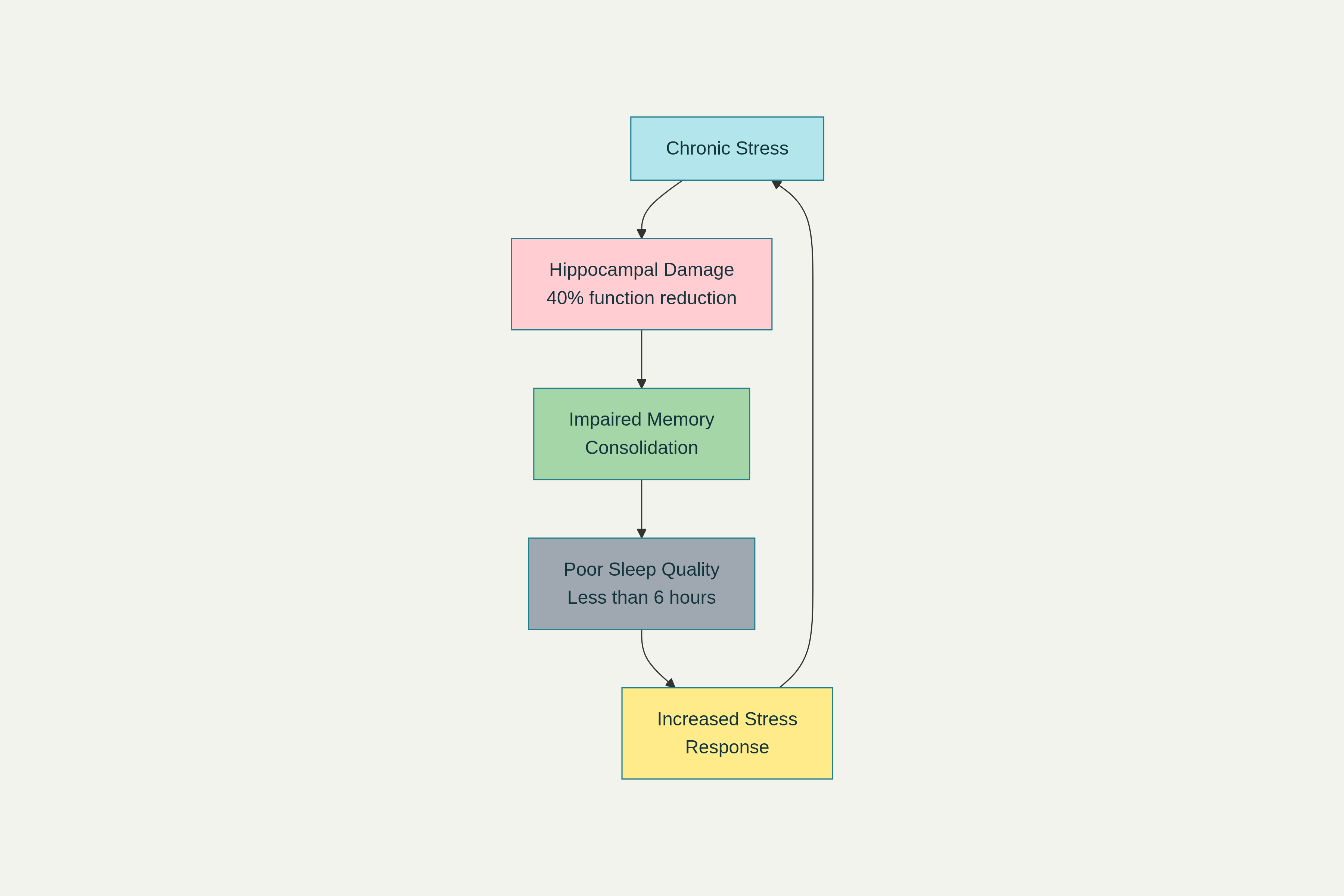Key Highlights:
- Global sleep crisis: Over 32% of adults worldwide experience insufficient sleep, with nearly three nights of restorative sleep lost weekly according to CDC and ResMed research
- Memory consolidation disruption: Sleep deprivation impairs hippocampal function by 40%, significantly affecting learning capabilities and cognitive performance
- Stress-induced brain changes: Chronic stress causes measurable structural alterations in memory-processing regions, particularly the hippocampus and prefrontal cortex
Opening Remark
Sleep, stress, and memory function as an interconnected trio that fundamentally shapes brain health outcomes across populations worldwide. Current research reveals that inadequate sleep affects cognitive performance while chronic stress creates lasting structural changes in memory-processing brain regions. Understanding how sleep, stress, and memory interact becomes essential as modern lifestyles increasingly compromise these foundational elements of neurological wellbeing.
The relationship between sleep, stress, and memory represents one of neuroscience’s most critical discoveries for public health. Studies demonstrate that sleep deprivation reduces learning capacity by up to 40%, while chronic stress fundamentally alters hippocampal structure and function. These findings underscore how sleep, stress, and memory collectively determine cognitive resilience and long-term brain health outcomes.
The Global Sleep Crisis Affecting Brain Health
- Statistics reveal widespread sleep deficiency: CDC data shows 32.8% of adults fail to achieve recommended sleep duration
- Economic impact: Sleep-related productivity losses could reach $718 billion across five developed nations by 2025

Global sleep deficiency statistics showing percentage of adults not achieving recommended sleep duration across different regions
Modern society faces an unprecedented sleep crisis that directly compromises brain health through disrupted sleep, stress, and memory processes. The Centers for Disease Control and Prevention reports that approximately one-third of American adults consistently fail to obtain the recommended seven to nine hours of nightly sleep. This sleep deficiency varies significantly by geographic location, ranging from 30% of adults in Vermont to 46% in Hawaii.
International research confirms this pattern extends globally, with ResMed’s 2025 Global Sleep Survey revealing that people lose nearly three nights of restorative sleep weekly. The study encompassed 30,026 respondents across 13 markets, demonstrating how sleep, stress, and memory disruptions create widespread public health challenges. Stress emerges as the primary sleep disruptor, affecting 57% of survey participants, followed by anxiety at 46% and financial pressures at 31%.
The economic consequences of compromised sleep, stress, and memory function prove substantial. Research organization RAND projects that insufficient sleep could cost up to $718 billion in productivity losses across five OECD countries by 2025, representing 1.4% to 3.2% of individual gross domestic products. These figures highlight how disrupted sleep, stress, and memory patterns create cascading effects throughout society.
Sleep deficiency particularly impacts cognitive performance through impaired memory consolidation processes. The Sleep Foundation confirms that insufficient sleep reduces learning abilities by as much as 40%, directly affecting how sleep, stress, and memory systems coordinate brain health function. This cognitive impairment occurs because sleep plays essential roles in filtering important memories while discarding excessive information during both NREM and REM sleep stages.
How Chronic Stress Restructures Memory Centers
- Hippocampal damage: Chronic stress causes measurable reductions in hippocampal volume and dendritic complexity
- Cortisol effects: Elevated stress hormones impair long-term potentiation, the cellular basis of learning and memory

The interconnected cycle showing how sleep, stress, and memory influence each other in brain health
Chronic stress fundamentally alters brain health structures responsible for processing sleep, stress, and memory interactions. Research demonstrates that prolonged stress exposure causes significant structural changes in the hippocampus, a critical region for memory formation and consolidation. These alterations include reduced dendritic complexity, suppressed neurogenesis, and decreased hippocampal volume.
The hippocampus contains dense concentrations of corticosteroid receptors, making it particularly vulnerable to chronic stress effects. Studies show that three weeks of chronic stress or elevated corticosterone levels severely impair long-term potentiation induction across all hippocampal areas, including CA1, CA3, and dentate gyrus regions. This impairment directly affects how sleep, stress, and memory systems coordinate to strengthen synaptic connections during learning processes.
Chronic stress disrupts the delicate balance between excitatory and inhibitory neurotransmission in memory circuits. Research reveals enhanced NMDA-receptor dependent transmission in the CA3 area and increased AMPA-receptor mediated synaptic transmission in the dentate gyrus following prolonged stress exposure. Additionally, chronic stress reduces GABAergic network functionality in the hippocampal CA1 area, presumably through decreased parvalbumin-positive interneuron populations.
The structural consequences of chronic stress on sleep, stress, and memory processing extend beyond the hippocampus to affect prefrontal cortex and amygdala function. Meta-analyses confirm that stress suppresses neurogenesis in the dentate gyrus while altering synaptic plasticity mechanisms essential for memory consolidation. These changes create lasting vulnerabilities that compromise cognitive resilience and increase susceptibility to stress-related psychopathology.
Importantly, the effects of chronic stress on sleep, stress, and memory systems differ significantly from acute stress responses. While acute stress may enhance certain memory processes, chronic stress creates cumulative damage that cannot be explained simply as prolonged acute effects. This distinction proves crucial for understanding how sustained stress exposure fundamentally reorganizes neural networks involved in memory processing.
Sleep’s Essential Role in Memory Consolidation
- Memory processing stages: Both NREM and REM sleep contribute distinct functions to memory consolidation
- Synaptic homeostasis: Deep sleep enables the reorganization of unstable memories into permanent storage
Sleep serves as the foundation for optimal memory consolidation, directly influencing how sleep, stress, and memory systems maintain cognitive function. During sleep, the brain health actively processes information acquired during waking hours, filtering important memories while discarding unnecessary details. This consolidation process occurs across multiple sleep stages, with non-rapid eye movement (NREM) and rapid eye movement (REM) sleep contributing complementary functions.professional.
The initial NREM stages prepare the brain health for new learning by organizing and strengthening recently acquired information. Deep NREM sleep, characterized by slow oscillations and sleep spindles, facilitates the transfer of unstable memories from the hippocampus to the neocortex where they become permanently stored. Research confirms that this synaptic homeostasis process during N3 sleep phase enables memory consolidation at cellular and molecular levels.
REM sleep specifically processes emotional memories, helping individuals cope with difficult experiences while integrating new information with existing memory networks. Studies demonstrate that dream experiences during REM sleep directly reflect memory consolidation activities, with task-related dream content predicting enhanced memory performance. Participants who dreamed about learning tasks showed ten-fold greater improvement compared to those without task-related dreams.
Sleep deprivation severely disrupts these memory consolidation processes, creating measurable deficits in cognitive performance. A 2024 cross-sectional study involving 100 adults found that participants sleeping less than four hours or more than eight hours showed significantly lower cognitive scores compared to those achieving six to eight hours of sleep. The study used standardized assessments including the Mini-Mental State Examination, Trail Making Tests, and Digit Span Test to demonstrate optimal cognitive performance within the six to eight hour sleep range.
Neurophysiological research reveals that 24-hour sleep deprivation causes prolonged P300 latency, decreased amplitude, and increased reaction times, indicating compromised attention and memory functions. Sleep deprivation reduces brainstem neuron sensitivity to auditory signals while decreasing cognitive processing speed. These findings demonstrate how disrupted sleep, stress, and memory interactions create cascading effects on cognitive performance.
Evidence-Based Strategies for Brain health Protection
- Sleep hygiene protocols: Maintaining consistent sleep-wake cycles with stress management techniques
- Lifestyle interventions: Regular exercise, yoga, and controlled caffeine intake support healthy sleep patterns
Protecting brain health requires targeted interventions that address the interconnected nature of sleep, stress, and memory systems. Evidence-based strategies focus on establishing consistent sleep-wake cycles while implementing stress management techniques that support optimal cognitive function. The American Heart Association emphasizes that addressing sleep disorders and disturbed sleep patterns prevents compromised brain health outcomes including stroke risk and cognitive decline.professional.
Sleep hygiene protocols form the foundation of brain health protection strategies. Research supports increasing natural light exposure during daytime hours while avoiding stimulants like caffeine near bedtime. Creating calm, cool bedroom environments facilitates the natural sleep cycle progression essential for memory consolidation. These environmental modifications directly support the sleep, stress, and memory coordination required for optimal brain function.
Regular exercise combined with yoga practice effectively reduces stress while promoting healthy sleep patterns. Physical activity boosts brain health by improving memory, reducing anxiety, and supporting emotional balance. The Centers for Disease Control and Prevention confirms that physical activity enhances cognitive abilities including thinking, learning, and problem-solving skills. This multi-faceted approach addresses how sleep, stress, and memory systems work together to maintain neurological wellbeing.
Stress management techniques prove essential for protecting memory processing capabilities. Recent research demonstrates that while acute stress can enhance memory encoding through increased hippocampal connectivity, chronic stress creates detrimental effects on cognitive function. Implementing mindful relaxation practices, digital detox strategies, and cognitive behavioral therapy for insomnia helps break the cycle of sleep anxiety that increasingly affects younger generations.
Timing daily activities strategically supports optimal sleep, stress, and memory coordination. Experts recommend scheduling stressful tasks earlier in the day while reserving relaxing activities like reading or light exercise for evening hours. This approach aligns with natural circadian rhythms while preventing stress-induced sleep disruption. Avoiding late-night screen exposure further supports healthy sleep architecture necessary for memory consolidation.
Closing Assessment: The Future of Brain Health
The intricate relationship between sleep, stress, and memory represents a fundamental determinant of cognitive resilience and long-term neurological wellbeing. Current research demonstrates that sleep serves as the foundation for brain health, comparable to diet and exercise’s role in cardiovascular wellness. As global sleep deficiency affects over one-third of adults worldwide, addressing these interconnected systems becomes increasingly critical for public health outcomes.
Evidence consistently shows that simple lifestyle modifications can significantly enhance brain health function by optimizing sleep, stress, and memory coordination. The emerging concept of “sleep capital” emphasizes how adequate sleep generates compound social, economic, and health benefits that extend beyond individual wellbeing to benefit entire societies. Understanding these connections empowers individuals to make informed decisions that protect cognitive function while supporting optimal brain health throughout the lifespan.
Future interventions will likely incorporate AI-driven technologies for early detection and personalized treatments targeting sleep, stress, and memory optimization. As neuroscience continues revealing the mechanisms underlying these critical brain health processes, evidence-based approaches will become increasingly sophisticated in preventing neurodegenerative risks and maintaining cognitive vitality.


